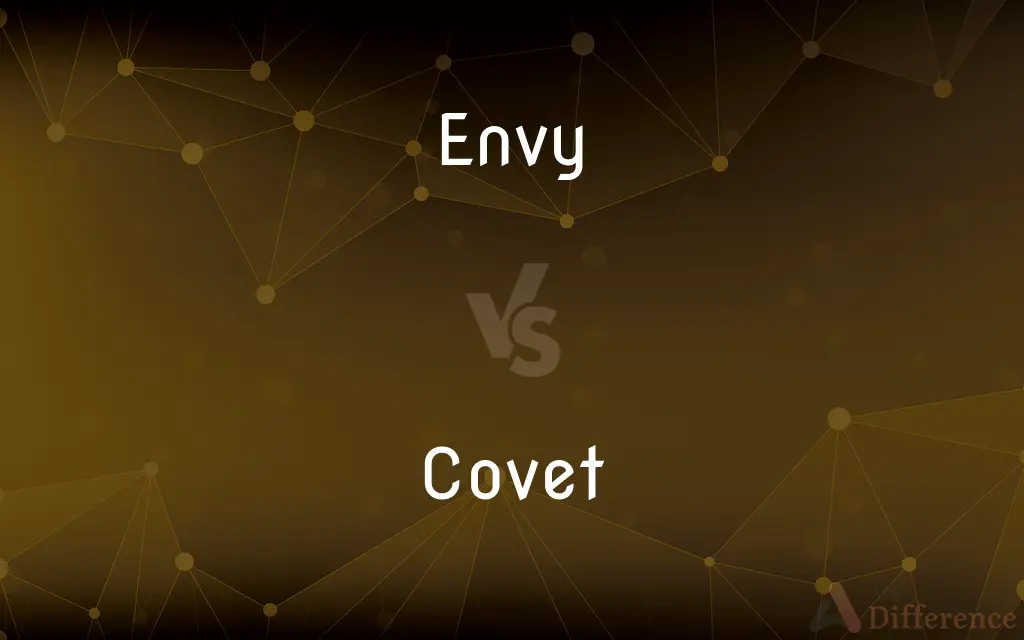Envy vs. Covet — What's the Difference?
By Fiza Rafique & Maham Liaqat — Updated on March 30, 2024
Envy involves feeling discontented or resentful longing due to someone else's possessions, qualities, or luck, whereas covet means to desire someone else’s possessions jealously, often with the intent to obtain them.

Difference Between Envy and Covet
Table of Contents
ADVERTISEMENT
Key Differences
Envy is an emotion that stems from seeing someone else possessing something (qualities, achievements, possessions) that one wishes they had, but it doesn't necessarily involve a desire to take it away from the person. Whereas covetousness is a strong desire to possess what belongs to someone else, often with a willingness to go to great lengths to obtain it.
Envy can often be a passive feeling, where one might feel sad or inadequate because of someone else's success or happiness, whereas coveting is an active desire or lust for possession, which can drive a person to think of ways to acquire the object of their desire.
Envy can sometimes serve as a motivator for individuals to improve their situation or achieve more, by highlighting areas in their life they are dissatisfied with. On the other hand, covetousness often leads to negative thoughts and actions, such as resentment towards the person who owns the desired object or even plotting to obtain it.
While envy is considered to be a negative emotion, it is often seen as less harmful than covetousness because it doesn't necessarily include the intent to deprive others of their belongings. Covetousness, by its very nature, involves a direct desire to take what is not rightfully one's own, making it morally and ethically more problematic.
Comparison Chart
Definition
Feeling discontent due to others' possessions or qualities.
Strong desire to possess others’ belongings.
ADVERTISEMENT
Nature
More passive; involves longing or sadness.
More active; involves a strong desire to obtain.
Motivation
Can motivate self-improvement.
Often leads to negative thoughts or actions.
Intent
Does not necessarily include the intent to take away.
Involves a desire to take what belongs to someone else.
Ethical Implication
Seen as less harmful; more about feeling than action.
Considered more problematic due to intent to deprive.
Compare with Definitions
Envy
The feeling of wanting to be in someone else's position or status.
Her envy of their close relationship was evident in her tone.
Covet
The act or state of coveting involves a strong desire for material possessions.
His covetous nature led him to constantly desire more, never feeling satisfied.
Envy
A sense of injustice or sadness over not having something.
Envy filled him when he thought of all the opportunities his friend had been given.
Covet
To desire something intensely, often with little regard for the ethics of obtaining it.
She coveted the lead role in the play, despite it being promised to another.
Envy
A feeling of discontented or resentful longing aroused by someone else's possessions, qualities, or luck.
She felt a pang of envy when she saw her friend's new car.
Covet
Yearn to possess or have (something belonging to someone else).
He coveted his neighbor's new sports car.
Envy
Desire to have a quality, possession, or other desirable attribute belonging to someone else.
He had always had a great envy for his brother's musical talent.
Covet
An intense desire that often overshadows moral or ethical considerations.
Her covet for the heirloom ring led her to deceitfully claim it as hers.
Envy
Envy can manifest as a motivator to achieve greater personal success.
Used positively, her envy drove her to work harder in her own career.
Covet
Covetousness can lead to unethical actions to obtain what one wants.
In his covet to achieve success, he crossed moral boundaries.
Envy
Envy (from Latin invidia) is an emotion which occurs when a person lacks another's superior quality, achievement, or possession and either desires it or wishes that the other lacked it.Aristotle defined envy as pain at the sight of another's good fortune, stirred by "those who have what we ought to have". Bertrand Russell said that envy was one of the most potent causes of unhappiness.
Covet
Yearn to possess (something, especially something belonging to another)
I covet one of their smart bags
Envy
A feeling of discontented or resentful longing aroused by someone else's possessions, qualities, or luck
She felt a twinge of envy for the people on board
Covet
To feel strong or immoderate desire for (that which is another's).
Envy
Desire to have a quality, possession, or other desirable thing belonging to (someone else)
I envy Jane her happiness
He envied people who did not have to work at the weekends
Covet
To wish for (something) longingly.
Envy
A feeling of discontent and resentment aroused by and in conjunction with desire for the possessions or qualities of another. See Usage Note at jealous.
Covet
To covet that which is another's.
Envy
The object of such feeling
Their new pool made them the envy of their neighbors.
Covet
(transitive) To wish for with eagerness; to desire possession of, often enviously.
Envy
(Obsolete) Malevolence.
Covet
(transitive) To long for inordinately or unlawfully; to hanker after (something forbidden).
Envy
To feel envy toward (another person).
Covet
(intransitive) To yearn; to have or indulge an inordinate desire, especially for another's possession.
Envy
To regard (something) with envy.
Covet
To wish for with eagerness; to desire possession of; - used in a good sense.
Covet earnestly the best gifts.
If it be a sin to covet honor,I am the most offending soul alive.
Envy
Resentful desire of something possessed by another or others (but not limited to material possessions).
Covet
To long for inordinately or unlawfully; to hanker after (something forbidden).
Thou shalt not covet thy neighbor's house.
Envy
An object of envious notice or feeling.
Covet
To have or indulge inordinate desire.
Which [money] while some coveted after, they have erred from the faith.
Envy
(obsolete) Hatred, enmity, ill-feeling.
Covet
Wish, long, or crave for (something, especially the property of another person);
She covets her sister's house
Envy
(obsolete) Emulation; rivalry.
Envy
(obsolete) Public odium; ill repute.
Envy
A red-skinned variety of eating apple.
Envy
(transitive) To feel displeasure or hatred towards (someone) for their good fortune or possessions.
Envy
(transitive) To resentfully or discontentedly desire (something someone else has that one lacks).
Envy
To have envious feelings (at).
Envy
To give (something) to (someone) grudgingly or reluctantly; to begrudge.
Envy
(obsolete) To show malice or ill will; to rail.
Envy
(obsolete) To do harm to; to injure; to disparage.
Envy
(obsolete) To hate.
Envy
(obsolete) To emulate.
Envy
Malice; ill will; spite.
If he evade us there,Enforce him with his envy to the people.
Envy
Chagrin, mortification, discontent, or uneasiness at the sight of another's excellence or good fortune, accompanied with some degree of hatred and a desire to possess equal advantages; malicious grudging; - usually followed by of; as, they did this in envy of Cæsar.
Envy is a repining at the prosperity or good of another, or anger and displeasure at any good of another which we want, or any advantage another hath above us.
No blissEnjoyed by us excites his envy more.
Envy, to which the ignoble mind's a slave,Is emulation in the learned or brave.
Envy
Emulation; rivalry.
Such as cleanliness and decencyPrompt to a virtuous envy.
Envy
Public odium; ill repute.
To lay the envy of the war upon Cicero.
Envy
An object of envious notice or feeling.
This constitution in former days used to be the envy of the world.
Envy
To feel envy at or towards; to be envious of; to have a feeling of uneasiness or mortification in regard to (any one), arising from the sight of another's excellence or good fortune and a longing to possess it.
A woman does not envy a man for his fighting courage, nor a man a woman for her beauty.
Whoever envies another confesses his superiority.
Envy
To feel envy on account of; to have a feeling of grief or repining, with a longing to possess (some excellence or good fortune of another, or an equal good fortune, etc.); to look with grudging upon; to begrudge.
I have seen thee fight,When I have envied thy behavior.
Jeffrey . . . had actually envied his friends their cool mountain breezes.
Envy
To long after; to desire strongly; to covet.
Or climb his knee the envied kiss to share.
Envy
To do harm to; to injure; to disparage.
If I make a lieTo gain your love and envy my best mistress,Put me against a wall.
Envy
To hate.
Envy
To emulate.
Envy
To be filled with envious feelings; to regard anything with grudging and longing eyes; - used especially with at.
Who would envy at the prosperity of the wicked?
Envy
To show malice or ill will; to rail.
Envy
A feeling of grudging admiration and desire to have something possessed by another
Envy
Feel envious towards; admire enviously
Envy
Be envious of; set one's heart on
Common Curiosities
What is envy?
Envy is a feeling of discontent or longing elicited by someone else’s possessions, qualities, or luck.
Can envy be positive?
Yes, if used as motivation to better oneself or to achieve personal goals, envy can have a positive outcome.
Can covetousness be justified?
Covetousness is difficult to justify ethically, as it involves desiring what is not rightfully one's own and can lead to harmful actions.
How can one manage feelings of envy?
Managing envy involves self-reflection, focusing on personal growth, and cultivating gratitude for what one already has.
What does it mean to covet something?
To covet something means to have a strong desire to possess it, especially something that belongs to someone else.
How can one differentiate between envy and admiration?
Envy involves a sense of discontent or longing, while admiration is a positive feeling of respect or esteem without the desire to possess.
How does covetousness differ from envy?
Covetousness is an intense desire to possess what belongs to someone else, often leading to negative actions, whereas envy is more about feeling inadequate or longing without the intent to deprive.
Is envy always negative?
While often seen as negative, envy can sometimes motivate individuals to improve their own situation or achievements.
Is it normal to feel envy?
Feeling envy is a common human emotion and can be considered normal, though it's important to manage such feelings constructively.
What is the main difference between envy and jealousy?
The main difference is that envy involves wanting what someone else has, while jealousy involves fearing losing what one has to someone else.
How do cultures view envy and covetousness?
Cultural views vary, but generally, both envy and covetousness are seen negatively, though some cultures may recognize the motivational aspect of envy.
Why is covetousness considered unethical?
Covetousness is considered unethical because it involves the desire to take something that rightfully belongs to someone else, often leading to morally questionable actions.
How can one overcome covetousness?
Overcoming covetousness involves cultivating contentment, ethical values, and focusing on personal achievements rather than desiring others’ possessions.
Is covetousness a form of greed?
Yes, covetousness can be considered a form of greed, especially in its intense desire for material possessions.
Can covetousness affect relationships?
Yes, covetousness can negatively affect relationships by fostering mistrust, resentment, and unethical behavior.
Share Your Discovery

Previous Comparison
Arrive vs. Depart
Next Comparison
Mecha vs. MechAuthor Spotlight
Written by
Fiza RafiqueFiza Rafique is a skilled content writer at AskDifference.com, where she meticulously refines and enhances written pieces. Drawing from her vast editorial expertise, Fiza ensures clarity, accuracy, and precision in every article. Passionate about language, she continually seeks to elevate the quality of content for readers worldwide.
Co-written by
Maham Liaqat















































